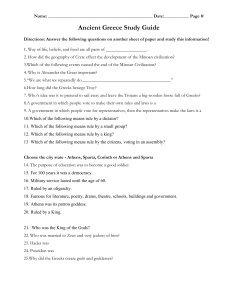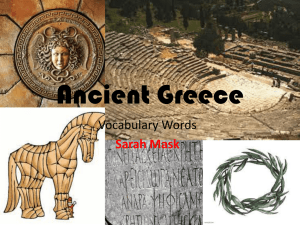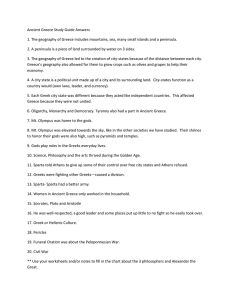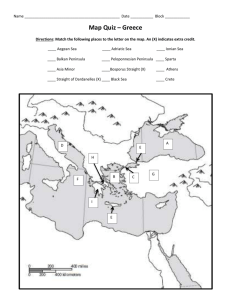File
advertisement
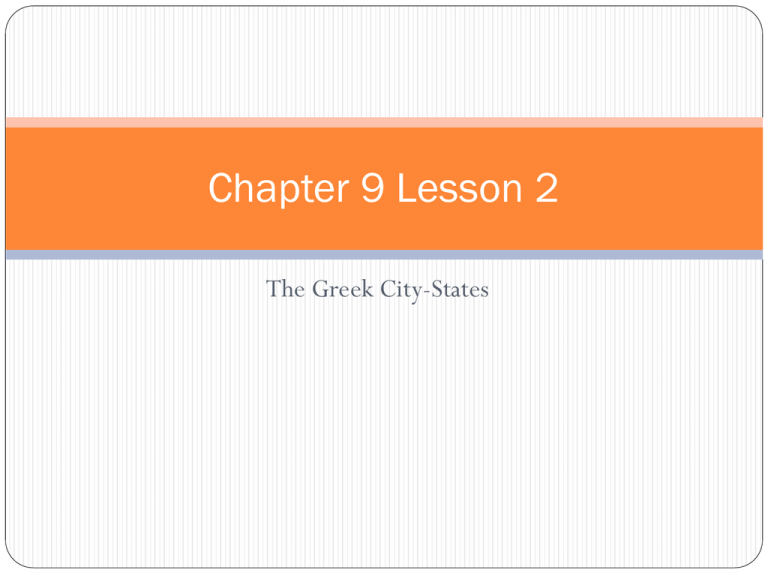
Chapter 9 Lesson 2 The Greek City-States You Are There You feel like it’s time for a good action-adventure story. Picking up a book of Greek tales, you begin to read. For a long time, the battle between the god Zeus and the powerful giants has raged. You Are There Armed with thunder-bolts, mighty Zeus has finally destroyed his enemies. Now Zeus, rules the gods and goddesses. As time passes, Zeus becomes father to many new gods and goddesses. You Are There The goddess Athena is born when Zeus is struck on the head. She springs from his forehead, full grown, in full armor, and with a loud battle cry. Athena is known as the goddess of wisdom. You Are There However, she is also a warrior goddess. Athena aids the Greeks in the most famous of legendary battles, the Trojan War. Will Athena’s power be greater than that of the gods who are helping Troy? You can hardly wait to read what happens next. The Power of Greek Myths and Legends In the Trojan War – fought between the Greeks and the people of Troy – gods and goddesses helped heroes on both sides of the battle. In ancient Greece, daily life often focused on trying to keep these gods and goddesses happy. Troy – a city on the western coast of Asia Minor – really existed. The Power of Greek Myths and Legends However, the story of the war is a blend of legend and myth. Legends - are about heroes and their great deeds. Myths – are traditional stories that may include gods and goddesses and that often try to explain events in nature. The Power of Greek Myths and Legends Greece’s city-states appear in many myths. Sparta was the home of Helen, who was carried off to Troy. This started the Trojan War. The Power of Greek Myths and Legends Athens was named for Athena, who helped the Greeks during the war. To end the war, the Greeks built a giant, wooden horse. The Trojans thought it was a gift that showed that the Greeks had surrendered. The Power of Greek Myths and Legends They pulled the horse into the city. At night, Greek soldiers crept out of the horse and opened the city gates to the Greek army. According to tradition, a blind poet named Homer composed two poems about this war. The Power of Greek Myths and Legends These poems are the Iliad and the Odyssey. The Iliad tells about the war itself. One of the heroes in the Iliad was Odysseus. The Odyssey tells of Odysseus, whose ship, while sailing home, was blown off course by gods he had angered. The Power of Greek Myths and Legends Before Home composed the Iliad and the Odyssey, myths and legends were part of what we call oral tradition. Oral tradition – stories passed down by word of mouth, from person to person. Now they are among the world’s most famous stories. The Gods of Mount Olympus Like most other ancient peoples, the Greeks worshiped many gods and goddesses. The Greeks developed many myths. Like the Egyptians, the Greeks turned to myths to help them understand the mysteries of nature and life. The Gods of Mount Olympus The myths helped them explain birth, death, disease, storms, and victories and defeats in battle. The Greeks believed that most gods lived on Mount Olympus, located in northern Greece. Mount Olympus – a mountain in northern Greece thought by the Greeks to be the home of their gods. The Gods of Mount Olympus The Greeks believed their gods and goddesses were very much like humans. They looked and acted like humans. They argued, fought, fell in love, and were jealous like humans. The Gods of Mount Olympus But, unlike humans, the gods were immortal – or able to live forever. They also had special powers. The Greeks honored their gods and goddesses in many ways. Every four years, the Greeks held athletic contests to honor Zeus, the king of the gods. Because these contests were held in the city of Olympia, they became known as the Olympic Games. Boxers, wrestlers, runners, and other athletes came from all parts of Greece to compete in the Olympics. The Gods of Mount Olympus The Greeks began to compete in these games about 3,500 years ago. Our modern Olympics are based on the ancient Greek games. Olympic Games – athletic contests held by the ancient Greeks about 3,500 years ago and revived in modern times. Democracy Begins in Greece The city-states of Greece developed many different forms of government. In some, a king ruled. In others, the government was controlled by members of wealthy, privileged families. Democracy Begins in Greece The form of government is known as an aristocracy. Aristocracy – a government controlled by a few wealthy people. Around 500 B.C., a new form of government developed in some city-states. Democracy Begins in Greece This new government became known as a democracy – or government by the people. Demos - is a Greek word that means “common people.” Kratos - is a Greek word that means “rule.” Democracy Begins in Greece The Greeks believed that people could think and act for themselves. They proposed that people could rule themselves better than any king could. Democracy arose from these beliefs. Democracy Begins in Greece The city-state of Athens was the best example of a Greek democracy. At first, Athens was governed by all citizens older than 18. This gathering of citizens was called the Assembly. Democracy Begins in Greece The Assembly soon became so large that it was hard to get anything done. Then, 500 citizens were selected to serve on a council for one year. These citizens were picked by choosing lots, or sticks, with numbers on them. Democracy Begins in Greece Actions of the council had to be approved by the Assembly of all citizens. Democracy had a very different meaning to the ancient Greeks than it does today. Democracy was limited to citizens. Democracy Begins in Greece Slaves, women, and workers born outside Athens were not citizens. They did not have the right to vote, own property, or testify in court. Rivals: Athens and Sparta In return for their rights, citizens of Athens had major responsibilities. They were expected to defend the city in times of conflict. They also had to take part in government by serving on juries and participating in political debates on important issues. Rivals: Athens and Sparta One of the greatest leaders in Athens, Pericles, described the responsibilities of citizenship: “We do not say that a man who takes no interest in politics is a man who minds his own business; we say that he has no business here at all.” Rivals: Athens and Sparta In many ways, Sparta – a city-state located in the southern part of Greece – was the opposite of Athens. The Spartans lived in a strictly ruled military states. Sparta invaded neighboring city-states, taking over farmlands and forcing the local people to become helots – or slaves. Rivals: Athens and Sparta Life in Sparta centered on the army. Government officials examined newborn infants to see if they were healthy. Only healthy infants were allowed to live. Rivals: Athens and Sparta When Spartan boys turned seven, they were sent to military camps to begin training for a lifetime in the army. Their training was brutal. They were given little food or clothing. They were expected to survive by stealing whatever they needed. Women in Sparta The state also expected Spartan women to be strong and responsible. They ran, wrestled, and played other active sports. When Spartan women sent their sons off to war, it was with this advice: “Return home with your shield or on it.” Women in Sparta Spartan men spent so much time with the army that their wives did not see them very often. Spartan women spent most of their time with each other. They had more personal rights than women in other Greek city-states. Women in Sparta They could own property and express opinions on important issues. They managed family estates while men were away at war. However, like the women of Athens, Spartan women could not take part in governing the city-state.
